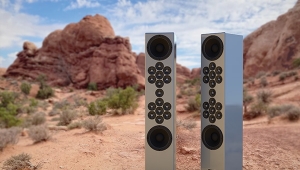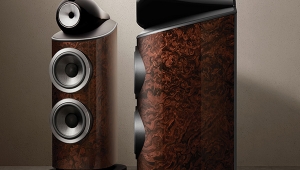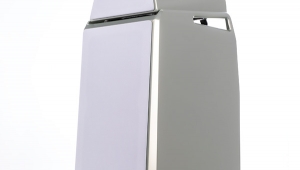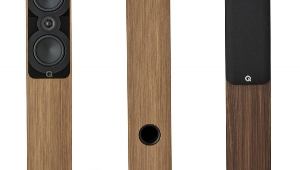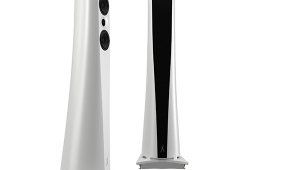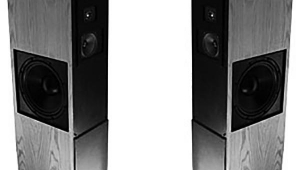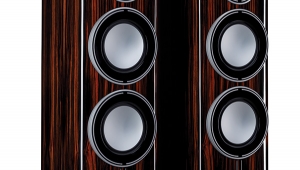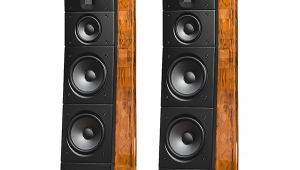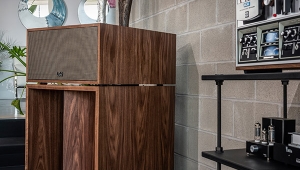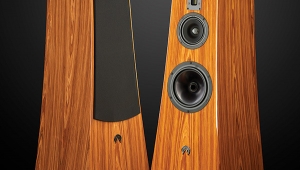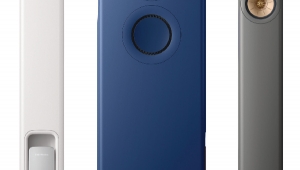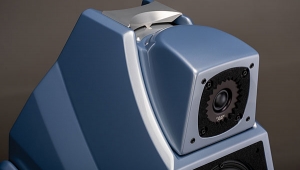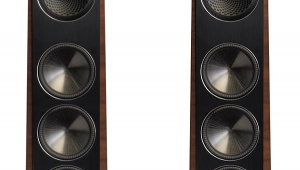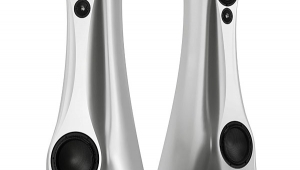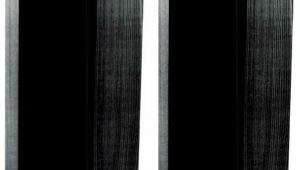| Columns Retired Columns & Blogs |
Definitive Technology Mythos STS SuperTower loudspeaker Page 2
You'll want that chair in the sweet spot, because the Mythos will keep you there for hours. At least, that's what kept happening to me. I'd grab a CD with a reference track I've used before and cue it up—for example, "At the Café Central," from David Murray's Shakill's Warrior (CD, DIW/Columbia CK 48963)—and the next thing I knew, I'd be lost in the music, having let five or six tracks go by without taking any notes.
Damned music just wouldn't let me work.
I turned "At the Café Central" up pretty loud. The STSes could really dish it out, from Murray's big, brassy tenor sax to Don Pullen's thunderously percussive Hammond B3. The DefTechs dug deep, too—Andrew Cyrille's kick drum had enough impact to blow out a candle.
Best of all, the speakers had no problem floating a convincingly life-sized soundstage that stretched the full 75" between them. Okay, maybe you couldn't quite fit a jazz quartet in that space, but the band sure didn't sound small.
While I was attempting to turn a box of office detritus into organized and alphabetized books and CDs, I discovered a sealed copy of the 2001 remastering of Mike Oldfield's Tubular Bells (SACD, Virgin 50733). Musing that I hadn't listened to this album since my lodgings reeked of pot and patchouli, I decided to open it and check out the first few minutes of Simon Heyworth's two-channel remix on the PCM track. Stop me if you've heard this one: Next thing I knew, Viv Stanshall was introducing the instruments—the part that, back in the day, signaled the end of side 1 and time for a munchie run.
Okay, that's not entirely true—I wasn't so lost in the music that I didn't pinch myself several times just to make sure I wasn't dreaming those intensely deep organ-pedal tones, the naturalness of that Girlie chorus, and, at the climax, the overtone clangor of the titular tubular bells.
Again, I was impressed by the immersive quality of the soundstage and the top-to-bottom solidity of the sound. The deep organ notes didn't have a separate, "subwoofery" quality from the mids and highs, but were cut from the same sonic staff paper. I was also able to turn the music up to satisfying rock levels without the speakers sounding shouty or strident. Not that I had to—I just could if I wanted.
Chant Mozarabe, a recording of Mozarabic chant by Marcel PérËs and Ensemble Organum (CD, Harmonia Mundi 901519), is one disc that I never expect to hear just a few tunes from. The music is so enthralling, the acoustic captured so realistically, and the performances so compelling, that I know I'm in for the duration of both services. And so it was with the STSes.
I knew that the DefTechs could handle the big and the brawny, but they were exceptional at capturing the small details that put the magic in Chant Mozarabe. The Ensemble Organum sounded reasonably life-sized, and the acoustic, while far from turning my room into a chapel, was convincingly huge. Immense, really.
Mozarabic chant isn't like Gregorian chant. (Mozarabic means non-Muslim, and refers to Christians living in Iberia under Islamic rule.) It predates the 11th-century liturgical reform, and even survived Alfonso el Sabio's decision to "replace" it with Carolingian Gregorian liturgy. The Spanish churches simply didn't comply—in fact, some monasteries set their scriptoria to painstakingly "fix" the melodies on parchment, which is how we can know what it sounded like (unlike the approximate notation of campo aperto).
I offer this little slab of musical pedagoguery not to show off, but to say that Mozarabic chant is different—it includes wild harmonic intervals never heard in Gregorian chant or polyphony. The STSes delivered those flatted fifths and sevenths with ear-dropping accuracy—there's just something about a nice, clangy harmonic cutting through a bed of acoustic sustain that lesser speakers don't quite capture. The DefTechs neither toned down the clang nor fuzzed up the suspension: the jewel stood out on its field.
Chant Mozarabe set me off on another of those threads along which one attempts to pursue a sustained segue by pulling out recordings in a similar vein—old standbys like Trio Mediaeval, the Tallis Scholars, the Hilliard Ensemble. However, after hearing PérËs through the DefTechs, I couldn't sustain interest for such a survey. As I said, Mozarabic chant is different. It can spoil you—as can the Mythos STS.
I trust all joy
The compare-and-contrast part of a review is usually pretty straightforward. Luxury speakers should be pitted against one another, as should budget integrateds, and so on. The Definitive Technology Mythos STS SuperTower posed a bit of a problem, however. It's an unusually elegant floorstanding loudspeaker that definitely qualifies as full-range, yet its price puts it in the range we audiophiles call "affordable," meaning that its cost approaches a house payment rather than the whole mortgage. Should I compare the STS to other speakers at its price? Other floorstanders? Full-size reference speakers?
After wrestling with this for a while, I came up with a simple solution: I would compare the DefTech to the Usher Audio Be-718—a speaker that, at $3000/pair, had also impressed me as punching above its class when I reviewed it in May. Also, I had a pair sitting outside my smaller listening room.
But while the Be-718 had robust bass for a stand-mounted two-way, it simply couldn't match the Mythos's bottom-end slam on David Murray's "At the Café Central." When Pullen literally pulls out the stops, the DefTechs captured the chest-slapping force of his Leslie Model 147 speaker without breaking a sweat. The Usher simply couldn't compete on the down-low, although it deftly followed Murray's lightning-fast waves of sound during the tenorman's breakout solo—and they didn't downsize him one jot.
With Tubular Bells, the Ushers again just didn't have the deep foundation that the DefTechs provided, although Oldfield's electric guitar and Farfisa organ were somewhat smoother in timbre. The DefTechs seem to emphasize certain tones over their neighbors in the upper midrange—not much, but there was a faint whiff of glassiness on those tones.
Chant Mozarabe's acoustic was larger and more real through the DefTechs. It happens to me frequently, but it comes as a surprise every time: Speakers that can truly reproduce deep, deep bass can float a room sound that's so light and natural and delicate that you'd swear there's nothing going on down there. Obviously, there is.
I also listened to David Russell's Aire Latino (CD, Telarc CD-80612). Obviously, with a solo classical guitar, there is nothing going on down there, but with the STS's sub, Russell's guitar sounded more like a guitar in a very real room.
I noticed again that when Marcel Péres hit certain notes in his solo passages, the STS gave some of them a different emphasis than others. Granted, Péres was singing with great force, and is not a "smooth" singer (not a criticism), but the Be-718 didn't react in this way—although it must be said that the Usher has its own slight tinge in the upper mids, so I don't completely absolve them from editorializing. I could easily live with either speaker's deviation from flat, but you should listen for yourself to see if you could.
The Usher Be-718 is a very impressive loudspeaker, and there are definitely those audiophiles who will prefer a stand-mounted two-way to a subwoofered tower, but those subs give the STSes a little something extra—and not only at 20Hz.
A thing of beauty is a joy forever
Holy crap! Did I just say the Definitive Technology Mythos STS SuperTower puts out 20Hz? It's actually rated to 16Hz, but I'm not sure my room can sustain that note. Certainly, the STS lacked nothing in the deep bass. Down there, it had power and glory.
There's something special about a speaker that can do that, but where the DefTechs really shone was in their effortless creation of a sonic holograph of the original musical event. Those events sounded real, they sounded right there, and they sounded solid enough to reach out and touch.
Is the Mythos STS perfect? Not quite. There's that slight glassiness I heard in the upper mids—an effect that wasn't so much a coloration as a difference in articulation. Some listeners will react to this more intensely than I did.
But that's little more than a mote in the eye compared to the timber balks of things the STS did right. It looks stylish, and it visually disappears into a room—if those qualities matter to you. And if performance is your thing, it has gobs of that. It just might be the best loudspeaker I've heard for $3000/pair. Surely there's not another that matches the Mythos STS's top-to-bottom coherence. If there is, I want to hear it. In fact, bring it on. Until then, the Definitive Technology Mythos STS SuperTower will be the speaker to beat in at least one of my listening rooms. Maybe in yours, too.
- Log in or register to post comments
